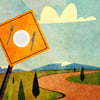Before we can address this question, we need to define the word “deli,” which is short for delicatessen. Break that word into two and you have:
Delicat: A word related to “delicacy” or “delicious”
Essen: “Food” or “eating” in Yiddish, German, and other languages
Delicatessen can refer to ready-to-eat foods or the store where you buy them. Classic examples include cold, cured meat on bread.
Is Deli Kosher?
In American-Jewish culture, a deli sandwich—especially corned beef on rye—is a classic Jewish food. However, it is important to note that many of the most famous “Jewish style” or even so-called “kosher style” delis in America are not, in fact, kosher.
So if you wish to dine at a deli, be sure to check for a recognized kosher certification on the wall, and if you’re building your own deli sandwich, be sure to use only kosher-certified meat, bread, and condiments—and leave out the cheese, since meat and dairy may never mix (for example, the famous Reuben sandwich contains Swiss cheese and is therefore not kosher).
What’s So Jewish About Delis
As Eastern-European Jews flocked to the United States around the turn of the 20th century, delis sprang up to serve them and became part of the Jewish culture. In addition to sandwiches, they often served a variety of Ashkenazi foods: chicken soup with kneidlach (matzo balls), knishes, and chopped liver. In fact, several classic deli foods are still associated with our people to this day:
- Jewish rye, which often contains caraway seeds (kimmel in Yiddish)
- Kosher dill pickles, with lots of garlic
And like the deli itself, neither of these foods can be assumed to be kosher unless they are certified as such, or you made them yourself in your kosher kitchen. See What Makes Kosher Pickles “Kosher”?
Jews and Salami

Jewish people probably gravitated toward deli meat for the same reason everyone else did: It’s delicious. However, there may be another element as well. If you are a traveling peddler, as many Jews were a century ago, your kosher options on the road were somewhat limited. However, a dry-cured salami could be easily packed (along with your tallit and tefillin and other belongings) to be eaten on the road, far from a kosher deli. And today, deli meats remain an easy, hardy item to bring along on road trips, to make sandwiches or wraps, so you don’t need to worry about buying food or cooking while you’re trying to vacation.
A Note About Blessings
Jewish people say a blessing before and after eating, with each type of food warranting a different formula. Now your deli sandwich will typically contain things from at least three classes:
- Bread: over which we say Hamotzi, blessing G‑d who “brings forth bread from the earth.”
- Meat: over which we say Shehakol, recognizing He “by whose word all came to be.”
- Veggie: over which we say Haadamah, blessing the One “who creates fruit of the earth.”
So which blessing do you say before eating your pastrami on rye? The answer is Hamotzi, the bread blessing. Why? Because it is the foundational food, described by King David as “nourishing the heart of man.”1
Forming Jewish Community
As Jews moved away from the inner city, most kosher (and “kosher-style”) delis have faded, with just a few holdouts remaining. In some cities, particularly those with limited kosher options, Chabad houses have opened kosher delis, where people can enjoy a kosher meal, take a trip down memory lane, meet fellow Jews, and showcase their Jewish pride.
Some recent examples:
- Deli 613 in Dublin, Ireland
- Maccabee’s Deli in Iowa City, Iowa
- Manhattan Ave. Deli in Santa Fe, New Mexico
So while the question of whether deli is “Jewish” is certainly debatable, all can agree that there’s nothing quite as tasty as a heap of glatt kosher pastrami peeking out from under a fresh slice of rye.







Join the Discussion